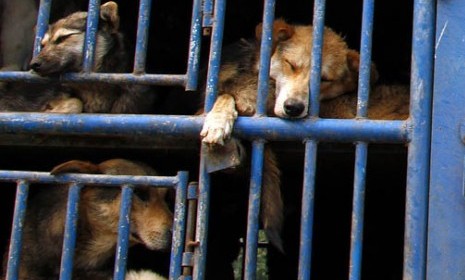A Chinese city's heartless plan to ban pet dogs
The city of Jiangmen had devised a brutal scheme to curb rabies and dog attacks — but anguished pet-owners prevailed at the last minute

A free daily email with the biggest news stories of the day – and the best features from TheWeek.com
You are now subscribed
Your newsletter sign-up was successful
Dog-friendly it isn't. In its determination to ban pet dogs, the southern Chinese city of Jiangmen (population: 3.8 million) recently gave pet-owning residents two equally heartbreaking options: Turn in your pet for adoption by country dwellers or have it euthanized. After pet lovers protested, reports The China Daily Thursday, the mandate was scrapped at the last minute, but dogs will now be prohibited in a number of public areas, including parks, schools, hotels, city squares, and malls. Here, a brief guide:
Why was Jiangmen planning to ban dogs anyway?
In recent years, the city has seen a rash of dog attacks. Last year, 12,014 residents in the districts where the ban was to be implemented suffered dog-attack injuries. Rabies is also a big issue. According to The Jiangmen Daily, as cited by The Daily Mail, 42 people in the area have died from rabies over the past three years. According to the Ministry of Health, some 2,400 people die of rabies in China each year.
The Week
Escape your echo chamber. Get the facts behind the news, plus analysis from multiple perspectives.

Sign up for The Week's Free Newsletters
From our morning news briefing to a weekly Good News Newsletter, get the best of The Week delivered directly to your inbox.
From our morning news briefing to a weekly Good News Newsletter, get the best of The Week delivered directly to your inbox.
Would the plan have allowed anyone to keep a dog or was it an across-the-board ban?
There was one exception: Residents who required a dog to guard a business dealing with valuables worth at least 5 million yuan, or approximately $776,000, could have kept their dog for security reasons if they applied for a special license.
Why doesn't the city just require dogs to be immunized?
Good question. Dr. Kati Loeffler, a vet the International Fund for Animal Welfare in China, says mass immunization would be a more effective means of dealing with rabies. "Decades of research internationally have shown culling is absolutely ineffective in controlling rabies," he says. According to a 2009 report from China's health ministry, just 20 percent of the country's 75 million dogs have their rabies vaccine.
A free daily email with the biggest news stories of the day – and the best features from TheWeek.com
Has anything like this been done before?
Yes, in 2009, more than 20,000 dogs were slaughtered in ten weeks in the northwest town of Hanzhong in an "irrational" reaction after eight humans were infected with rabies. At the time, The Telegraph's Peter Wedderburn described the "brutal" killings thus: "Men with sticks call dogs over as if to give them a treat, then they bludgeon the dogs to death, chasing them down the street as they squeal in terror." This past May, Shanghai, the country's largest city, instituted a "one-dog policy" to control the pet population and rabies. Under the new policy, families are only permitted one dog each. Beijing and Guagzhou also have such regulations in place.
Sources: China Daily, Daily Mail, Guardian, Huffington Post, NPR, Telegraph
-
 Political cartoons for February 20
Political cartoons for February 20Cartoons Friday’s political cartoons include just the ice, winter games, and more
-
 Sepsis ‘breakthrough’: the world’s first targeted treatment?
Sepsis ‘breakthrough’: the world’s first targeted treatment?The Explainer New drug could reverse effects of sepsis, rather than trying to treat infection with antibiotics
-
 James Van Der Beek obituary: fresh-faced Dawson’s Creek star
James Van Der Beek obituary: fresh-faced Dawson’s Creek starIn The Spotlight Van Der Beek fronted one of the most successful teen dramas of the 90s – but his Dawson fame proved a double-edged sword